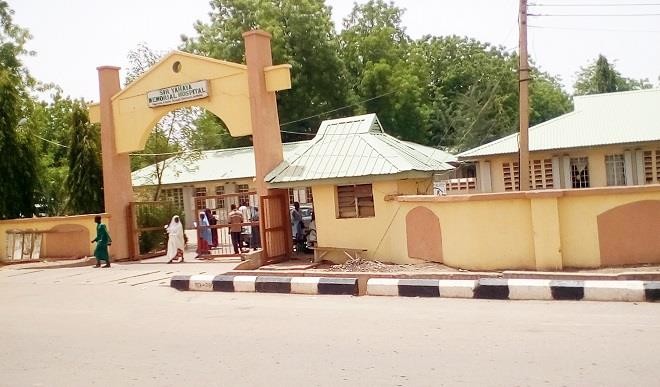
Sir Yahaya Memorial Specialist Hospital is the most visited and easily the biggest hospital in Kebbi State. It was built in 1951 as a cottage hospital. Over the years it grew to become a general hospital before its current status as a specialist hospital in the heart of Birnin Kebbi. Given its strategic location the hospital which serves as the last hope of the poor and rural dwellers, can be reached easily from any part of the township and beyond.
Majority of its nurses, doctors and orderlies are indigenes of the state. This makes many of the patients particularly those from the rural areas to be more comfortable with the hospital than many others in Birnin Kebbi because they understand whatever medical instructions they are given easily with the help of the medical staff who speak Hausa, Fulfulde, Dakarkari and the other three languages spoken in the state. Besides, Sir Yahaya gives specialist care which those who visit cannot get from other hospitals at a cheaper rate.
On a monthly basis the hospital records over 5,700 patronages, an average of 169 admissions, 91 surgeries and 200 deliveries. Despite the fact that mortality rate at the hospital is just 4 percent with 6 dialysis machines that no tertiary hospital in both Sokoto and Zamfara has, Sir Yahaya has only 34 resident doctors, 29 visiting doctors, 128 nurses, a few casual workers with a token of 3 million naira as monthly subvention from the State Government to attend to its medical activities.
The vision and mission of the hospital appears to be declining by the day due to its old structures, age and neglect of many years by successive governments in Kebbi State. At present, some of its structures, medical equipment and manpower can no longer meet with the needs and demands of the present day specialist hospital.
Some of those who visited the hospital in recent time always have one complaint or the other to make on the failure of its medical equipment, decline in efficient services, decaying infrastructure and poor sanitary condition of its wards, toilets and mortuary.
Hope rises for the hospital late last year when the Commissioner for Health, Alhaji Umar Usman Kambaza after the state executive council meeting announced that the State Government has decided to spend 2 billion naira to renovate and expand 13 of its general hospitals, and out of the amount 418 million naira would be spent on Sir Yahaya Specialist Hospital.
Kambaza said “Sir Yahaya memorial specialist hospital is a premier hospital older than many of us. We are aware that some of the hospital structures are old. The State Government has decided to award a contract for its renovation and expansion so that it could offer better health care services to the people. Very soon its challenges will be over. Yes we sometimes receive complaints about the attitude of some of the hospital staff. Some of these complaints might be true and some might have come from people who just want to say negative things about the hospital. Notwithstanding, we always take our time to investigate any of such complaints and address them. I even go to the hospital sometimes at night to see how they are performing their duties.”
Reacting to the issue of the challenges at the hospital, the Chief Medical Director, Doctor Jafar Muhammed Augie said “I quite agree that some of the structures are dilapidated and are not in conformity with the contemporary needs of a specialist hospital,but I am assured by the State Government that things will change and I see reason to believe so. The issue of manpower shortage in the health sector is not peculiar to Kebbi State. The population of Kebbi is 3.6 million. Doctors at both the state hospitals and the Federal Medical Centre combined are not more than 200 to look after a population of 3.6 million. The national average is 4 doctors to 6,000 people but here it’s a doctor to almost 70,000 people. If we don’t take steps to employ people to man our health facilities we will have problems. A health centre is not just a structure. We should put the necessary people there to achieve its health objectives. We need a strategic plan for human resource. Government needs to know how many facilities it has, what type of services they provide for the people and who are the people manning them. They should take the minimum number of those who can do the jobs at the hospitals, train and retrain and maintain them. There was a time the State Government was planning to give the state health workers same salaries similar to that of their colleagues at the FMC.
A professor at the Usman Dan Fodio University Teaching Hospital in Sokoto told me that at that period he came to recruit kebbi doctors for residence training at UDUTH, but he couldn’t get any. He even went from house to house but they refused to go with him because the welfare being planned for them was better than what they will be offered at UDUTH. Now if government can come out to say the condition of service of doctors in the state hospital would be the same with that of FMC, there will be a tremendous improvement in our hospitals. This is a specialist hospital where we give specialist care and services. We have consultants coming from UDUTH, FMC and other places to give specialist care to patients at a lower rate, than what UDUTH and FMC are offering.
As I speak, we have less than 10 resident consultants in the whole state. We have 34 resident doctors, 29 visiting doctors and 128 nurses presently at the hospital. The average monthly admission at the hospital is 169 with a monthly patronage of 5,700. It performs an average of 91 surgeries in a month. An average delivery rate per month is 200. The mortality rate is four percent which is better than what obtains in many other hospitals. The hospital has six dialysis machines which no tertiary hospital in other sister states has.”
On the allegation that corpses brought to the hospital sometimes get decomposed before they are ready for burial, he said “The mistake people make when they bring a corpse into this hospital is to go directly to the mortuary. We don’t keep corpses for 48 hours here. 24 hours is the regulation that we can keep a corpse in our cooling units. Many of the complaints over the hospital mortuary could as well be as a result of the unstable electricity supply. Even if we have functioning cooling units we cannot keep corpses unnecessarily long. This is a state government facility and for the hospital to continuously fuel its 500KV generator to maintain the cooling units will be difficult. It consumes a drum of diesel every four hours and we don’t have the financial strength to do that. If we are to keep the generator working for 12 hours we would need to spend N150,000 on fuel daily. In a month we would have spent more than the N3million we are given monthly to run the hospital. Remember ,fueling the generator is not the only thing the hospital has to spend the money on. To make things better, we decided to charge N2,000 on corpses people bring to the mortuary, but they couldn’t pay. At least with that we can maintain the cooling units and back up the generator with diesel, but people are not paying. Again, if we must keep the cooling units functioning for 24 hours we would need two mortuary attendants on a shift every eight hours. This means that we would need six mortuary attendants at a time. Just as shift is being done six people would have to be at the mortuary for 24 hours, and the following day another batch of six people will come to take over from them, making 12 attendants in all. Unfortunately we only have two trained apprentices as mortuary attendants in the hospital now, others are casual workers and we cannot ask them to stay overnight and work for us. We need competent hands here and that is one of the problems we are facing. People think since this is a state government hospital everything here should be free. The hospital mortuary has three cooling units,and out of these only one is not functioning. In the whole of Kebbi State it is only in this hospital that you can find cooling units.”
Commenting on the dilapidated structure and facilities at the hospital he said “About a week ago the state government sent a team of engineers from the state ministry of works to come and inspect and advice on how to renovate and expand the hospital. Some of its structures can no longer meet the needs and demands of today and they need to be replaced. We have written to the state government on this and they have sent their engineers here and we went round with them, put heads together and we came up with a gradual plan so that the hospital can be renovated without disrupting its activities. Anybody who is 60 years in this town knows only Sir Yahaya specialist hospital. Many of our officials are indigenes of Kebbi State and people from the rural areas easily understand instructions from them. It gives specialist care that people cannot get from other hospitals at a cheaper rate. C S is free of charge here until recently when we started charging N5,000 because the stocks that are supposed to be given to us to cover for that policy was not forth coming, so we decided to charge just N5,000. Many people who registered their wives in other hospitals always run here when it is time for them to deliver, and that is why we always have bed space deficiency here. If we don’t do anything to back up the policy we would have failure. Once government tells us this is its objective we try to see that it succeeds. We are civil servants and we work for the people with input from the government.”
He observed that the hospital regime is 5700 patients in a month. “Beside the issue of manpower shortage in the hospital, there is the additional issue of indiscipline among some of our staff. Since 2006 the hospital orderly are not employed. From retirement and death alone I have lost 52 staff and 10 years after they have not been replaced. Casual workers are given only N7,000 per month to keep the hospital clean. I cannot afford to take 12 of them in a big hospital of 250 beds capacity. Another challenge is that some of the patients instead of using the toilets prefers to just go somewhere beside it to defecate or urinate. Our nurses would have to educate some of the patients from the village on how to use the toilets. Unfortunately, only one person takes care of a ward of 30 persons and she would as well be shifting from cleaning the toilet to mopping the floors for a salary of N7,000. Government has to do more in employing the necessary personnel.It is not only the doctors and nurses that are important in the hospital, the orderlies are equally important. Government is aware of the challenges we are facing here. The only people who are not aware are those making allegations about the hospital. Maybe the government has its own reasons for not employing at the hospital from 2006 to date, but they have assured me things will change so we are waiting to see it.”

 Join Daily Trust WhatsApp Community For Quick Access To News and Happenings Around You.
Join Daily Trust WhatsApp Community For Quick Access To News and Happenings Around You.


